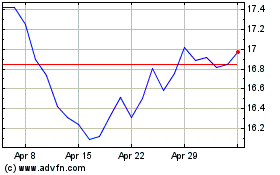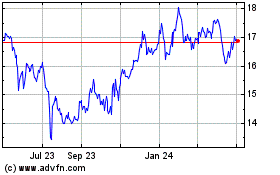By Sam Goldfarb
This article is being republished as part of our daily
reproduction of WSJ.com articles that also appeared in the U.S.
print edition of The Wall Street Journal (August 19, 2019).
AT&T Inc. has opened each of its earnings calls this year by
raising a topic that has been much on investors' minds: debt
reduction.
Making that subject a top priority is somewhat unorthodox in
corporate America but has been much appreciated on Wall Street,
where assessing the economic fundamentals of a handful of giant,
heavily indebted companies has consumed investors and analysts for
months.
While corporate leverage remains a topic of concern, companies
including AT&T -- triple-B borrowers whose credit ratings cling
to the lowest rung for investment-grade bonds -- have earned
plaudits by raising cash, setting plans to reduce debt and
generally trying to reduce their perceived risk profiles.
AT&T's unusual effort is a sign that "even their
shareholders are focused on their ability to pay down debt," said
John Sheehan, a fixed-income portfolio manager at Osterweis Capital
Management.
The newfound restraint of these firms is behind one of the most
surprising developments in financial markets: BBB-rated corporate
debt this year has outpaced other grades, belying fears that a
sector that has ballooned during a recent boom in mergers and
buybacks was vulnerable to a wave of potential downgrades.
AT&T, the world's largest nonfinancial corporate borrower,
has sold assets and used free cash flow to reduce its net debt by
roughly $9 billion since the start of the year. The beer company
Anheuser-Busch InBev SA has both cut its dividend and announced a
deal to sell its Australian unit in an effort to free up cash that
can be used to reduce its more than $100 billion debt load. And CVS
Health Corp. paid down $3.6 billion in the second quarter after
completing its acquisition of Aetna.
Overall, triple-B bonds have delivered 14.2% in total returns,
outpacing both higher-rated, single-A bonds, which have returned
12.7%, and lower-rated double-B bonds, which have returned 10.9%,
according to Bloomberg Barclays data.
There has been a strong wind at the back of triple-Bs. Both
safer than speculative-grade debt and higher-yielding than other
investment-grade bonds, triple-Bs have been a sweet spot for
investors facing slowing economic growth and a sharp decline in
U.S. Treasury yields.
The steps taken by some high-profile triple-B companies have
added to the rally because they have "allowed investors to feel
more comfortable" owning their bonds, said Rajeev Sharma, director
of fixed income at Foresters Investment Management Co.
Over the past decade, triple-Bs have grown from roughly 40% of
the investment-grade market to about half of it as companies bulk
up on debt in an era of low interest rates.
Some investors have said the increase in triple-B bonds is
worrisome because it means an unusually large number could be
downgraded to speculative grade in an economic downturn. That, in
turn, could lead to further economic disruption as businesses face
a big jump in their borrowing costs.
With little pressure on them to move faster, some companies such
as AB InBev have for years been slow to reduce debt-to-earnings
ratios after making large debt-funded acquisitions. Often, they
have tried to meet leverage targets more by growing earnings than
reducing debt.
That, according to investors, is why recent developments have
been so welcome as some companies take a more aggressive approach
to deleveraging.
At least in some cases, companies have been pushed in that
direction. AB InBev's dividend cut last October came after Moody's
Investors Service placed its credit ratings on review for a
downgrade.
Even so, Moody's lowered the company's ratings one level to
Baa1, a move some investors interpreted as a sign that the ratings
firm was becoming less tolerant of companies that drag their feet
on deleveraging.
Investors, too, have applied pressure. Before AT&T announced
a new deleveraging plan at an analyst meeting last fall, a broad
consensus had emerged that it needed to reduce debt to insure its
investment-grade status and the long-term viability of its
dividend. Though prioritizing debt reduction can sometimes come at
the expense of shareholders, AT&T shares rose 2.2% in the first
trading session after the meeting, easily outpacing the gains of
the broader market.
In total, AT&T has reduced net debt by $18 billion since it
closed its acquisition of Time Warner Inc. Another $12 billion of
net debt reduction is expected by the end of the year, and Chief
Executive Randall Stephenson has said the company will consider
share buybacks if they can reduce its net debt below its target of
2.5 times a measure of earnings.
There are definitely cases in which companies are "finding
leverage religion," typically if they have unusually large debt
loads or if their credit ratings have been lowered, said Josh
Lohmeier, head of North American investment-grade credit at Aviva
Investors.
Still, some investors and analysts say it's too soon to applaud
triple-B companies for reducing debt. There has been little
evidence of broad deleveraging. And if anything, aggregate leverage
ratios have ticked higher this year. That is a sign that not all
companies are being pushed to reduce debt and that even those that
are feeling pressure still have work to do.
While "there has been a pickup in rhetoric on debt management,"
there is less evidence of widespread deleveraging across the
triple-B sector, said Vishwas Patkar, an investment-grade
strategist at Morgan Stanley.
Drew FitzGerald contributed to this article.
Write to Sam Goldfarb at sam.goldfarb@wsj.com
(END) Dow Jones Newswires
August 19, 2019 02:47 ET (06:47 GMT)
Copyright (c) 2019 Dow Jones & Company, Inc.
AT&T (NYSE:T)
Historical Stock Chart
From Mar 2024 to Apr 2024

AT&T (NYSE:T)
Historical Stock Chart
From Apr 2023 to Apr 2024
